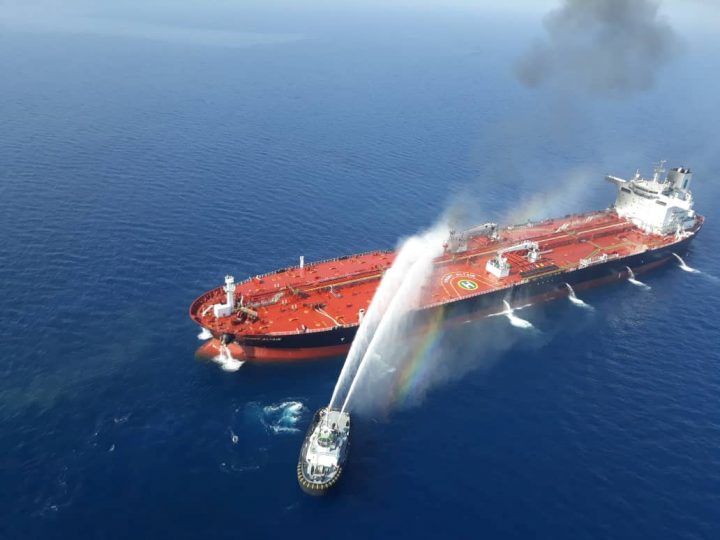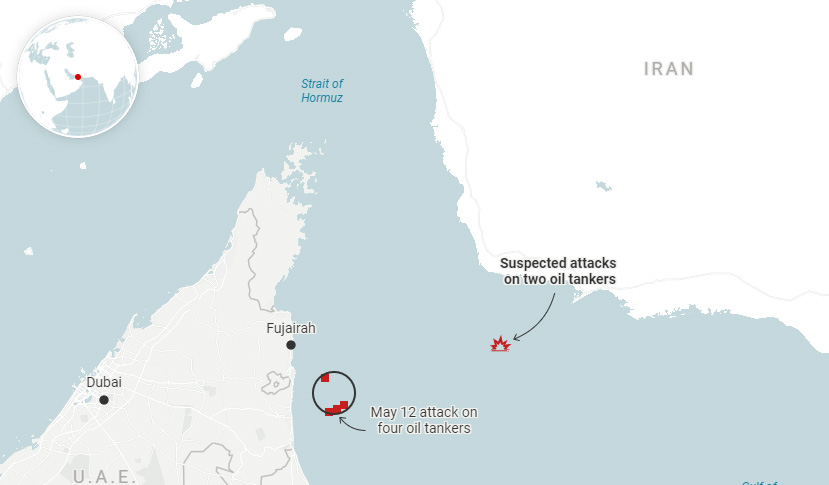U.S. President Donald Trump is pointing fingers at Iran for an attack Thursday on two fuel tankers in the Gulf of Oman.

The attacks come as tensions between the U.S. and Iran mount.
U.S. Secretary Mike Pompeo held a press conference Thursday in which he accused Iran of involvement in the attacks, which Iran dismissed.
No one has claimed responsibility.

The U.S. doubled down on accusations Friday with Trump telling Fox News the attacks “got Iran written all over it.”
But where is the claim coming from? Here is a breakdown of what we know so far:
What happened?
The two vessels were near the entrance to the Strait of Hormuz, between Oman and Iran, at dawn on Thursday when they came under attack. A fifth of all oil consumed globally passes through the strait, according to Reuters.
The chemical tankers caught fire after multiple blasts. One of the ships, a Japanese-owned tanker, was carrying methanol while the other Norwegian-owned ship was hauling naphtha.
The Japanese crew aboard the Kokuka Courageous said they saw two “flying objects” hurl towards the ship prior to the attack. There are also reports that limpet mines were spotted on the side of one of the ships prior to the explosions.
An official cause has not been confirmed.
The burning ships became stuck in the international waters after the blasts, but all crew members were evacuated safely. The crew of Norwegian tanker Front Altair were “safe and doing well” as of Friday said Frontline, the company who owns the ship.
In a statement to CNN, Frontline said a team will conduct a full damage assessment on Saturday but that no pollution has been reported from the vessel at this time.
Why does it matter?
The incident follows a similar one in May where four oil tankers were attacked nearby and disabled from underwater using limpet mines. The U.S. and Saudi Arabia blamed Iran for the attacks then as well, which Iran denied.
At the time, the Trump administration said it would send troops to the Middle East in response to reported threats by Iran. Tehran described the move as “psychological warfare,” according to Reuters.
WATCH: Explaining the rocky U.S.-Iran history in five minutes
The U.S.-Iran relationship took a hit last year when Trump pulled out of a 2015 deal between Iran and global powers to restrain nuclear goals in Tehran.
The move heightened tensions between the two.
The U.S. then moved to tighten sanctions on Iran, which has cut deeply into its oil exports.
Iran has given the European nations a July 7 deadline to come up with new terms for the nuclear deal.
If they can’t be reached, Iran could resume enriching uranium to be capable of making nuclear weapons.
WATCH: U.S. releases video claiming to prove Iran responsible for tanker attacks

Why the U.S. thinks Iran is at fault?
On Friday, Trump openly blamed Iran for the tanker attacks.
“Iran did do it,” Trump told Fox News. “I guess they didn’t want the evidence left behind.”
The Trump administration is citing video released by the U.S. military Friday that reportedly shows Iran’s Revolutionary Guard on boats removing an unexploded limpet mine from one of the ships. Officials suggest the attack resembles the one from May, pointing to the similar use of limpet mines. The mines are designed to halt a ship, but not sink it.
WATCH: Mike Pompeo: Iran is responsible for attacks in Gulf of Oman

Trump’s claims follow comments from Pompeo, who on Thursday said the U.S. assessment was “based on intelligence” and “expertise” needed to steer such attacks. Pompeo offered no evidence to support his statement and did not take questions from reporters.
“Taken as a whole, these unprovoked attacks present a clear threat to international peace and security, a blatant assault on the freedom of navigation and an unacceptable campaign of escalating tension by Iran,” he said during a press conference.
What is the response from Iran?
Iran has categorically denied the allegations from the Trump administration.
Iran’s foreign minister, Mohammad Javad Zarif, tweeted that the U.S. was jumping to allegations against Tehran. He claimed the U.S. finger pointing is part of a “Plan B” to “sabotage diplomacy” and “cover up its economic terrorism against Iran.”
In a statement from its UN mission, via The Associated Press, Iran accused the U.S. of causing more friction between the two.
“The U.S. economic war and terrorism against the Iranian people as well as its massive military presence in the region have been and continue to be the main sources of insecurity and instability in the wider Persian Gulf region and the most significant threat to its peace and security,” the statement reads.
What else is being said?
The European Union treaded lightly about the situation brewing between the U.S. and Iran on Friday, saying it would not jump to conclusions.
“As we assess the situation, our call is again to show maximum restraint and to avoid escalation and provocations,” a spokesperson said in a statement to CNN.
WATCH: Britain backs U.S. in blaming Iran for tanker attacks

In Britain, foreign secretary Jeremy Hunt called the attacks “deeply worrying.” Hunt told a radio station on Friday that, as of now, Britain is leaning toward the same assessment as the U.S. but will still conduct an investigation of its own.
“We have no reason not to believe the American assessment and our instinct is to believe it because they are our closest ally and we are very worried about the situation in Iran because, at the moment, both sides in this dispute think that the other side doesn’t want war,” he said.
“The risk you have is then they do something provocative that leads to catastrophic consequences that weren’t intended… We will be meshed in it because we have a lot of interests in that part of the world.”
— with files from Reuters and the Associated Press
- Canada refused to repatriate woman from ISIS camp because she can’t be arrested: internal memo
- Haiti’s PM resigns, paving way for new elections in violence-plagued nation
- U.S. tourist faces 12-year sentence for bringing ammo to Turks and Caicos
- Is Trump immune in the 2020 election case? What to watch for during hearing





Comments